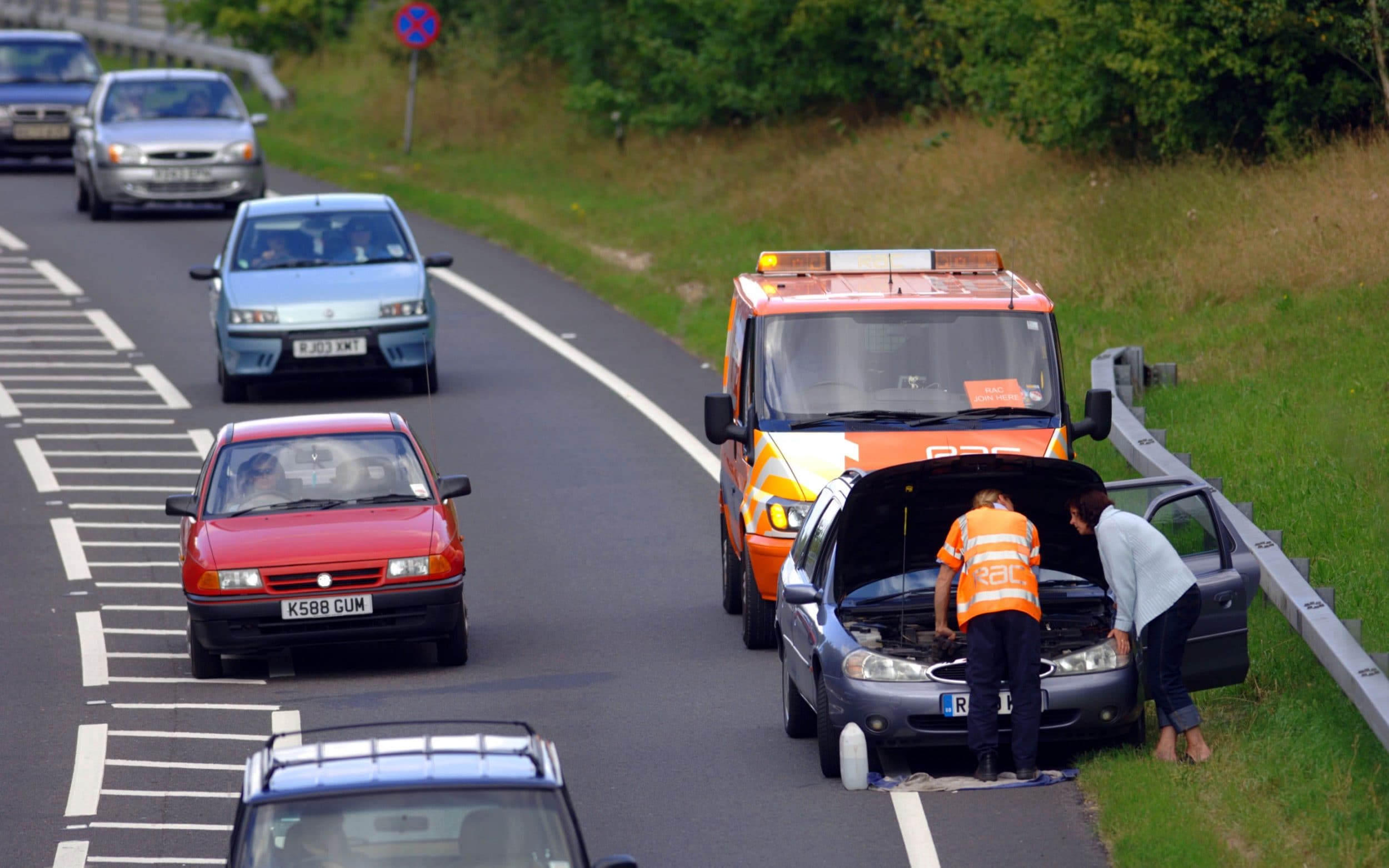RAC tells drivers to report breakdowns online, not by phone

The RAC is telling motorists to report breakdowns online, instead of making a phone call. Customers of the 127-year-old motor insurer are being told that they will receive faster service by reporting breakdowns through its website. An 85-year-old driver who does not own a smartphone told The Telegraph that he walked home to report a breakdown using his home computer after initially phoning for help when a wheel fell off his car.
Duncan Rayner, who has been an RAC customer[1] for 40 years, claimed he was left waiting more than 15 minutes after calling up, with an automatic message repeatedly telling him it would be easier to log his issue online. The grandfather said that even after he reported his breakdown through the RAC website, there was no response for a quarter of an hour. "If you're sitting in a car with traffic going past at 90 miles an hour on a motorway[2] ... that's not the sort of response you want," he said, adding that he had ended up paying a friend with a tow truck to get his vehicle home.
 The RAC said half the breakdowns it handles are reported by phone Credit: Jack Sullivan/Alamy
The RAC said half the breakdowns it handles are reported by phone Credit: Jack Sullivan/Alamy
Mr Rayner's car was left immobile on a busy B road with buses trying to squeeze past for around two hours, roughly 15 minutes from his home in Sunningdale, Berkshire[3].
"One of [the call handlers] actually just told me to go online and cut me off," he claimed, adding: "If they don't answer their phone and I'm stuck on a motorway, how on earth do I get in touch with them? "And I think that is the big problem facing not only me, but a hell of a lot of other drivers. You know, we don't all have smartphones."
He continued: "I tried to ring them, and I think I was on the phone for 15 or 20 minutes [with] no response, and then the phone line kept coming back to say 'the easiest way to get in touch with us is online'. So I waited, and then I eventually went online." After logging the breakdown online, and receiving no response for a further quarter of an hour, Mr Rayner said, he gave up, called a friend with a tow truck and walked back to his car.
The rescue cost him GBP100, which the RAC declined to reimburse[4]. In its initial automated response to Mr Rayner's complaint, the insurer said it could take up to eight weeks to "resolve" the issue. An RAC spokesman said: "We'd like to apologise to Mr Rayner for any confusion and will be offering him a gesture of goodwill."
Campaigners condemn policy
Charities and campaign groups condemned the motor insurer's policy of nudging customers online instead of making its services accessible to people without smartphones or tablets at hand.
Caroline Abrahams, charity director at Age UK, said: "Almost half of over-65s are either not online at all or lack the skills[5] and confidence to be able to use digital technology safely and successfully. "It follows that it's crucial that non-digital alternatives are always available in terms of accessing services, and that's as true of vehicle breakdown support as anything else. "We understand that companies are keen to control costs and that putting services online is one way of achieving this, but it's a total false economy if it disenfranchises literally millions of older people.
She also called for the Government to create "binding guidance" to make sure that "people who aren't online can still access all the services to which they are entitled". Dennis Reed, campaign director of Silver Voices, a senior citizens' campaigning organisation, said: "It's really saying to older customers: get lost. It's disgusting that [companies] are not providing an efficient alternative.
"I'm not saying that it's wrong to have that online option at all," he continued, "but there should be an alternative, particularly when people who may be vulnerable are breaking down in isolated positions."
RAC apologises
An RAC spokesman said the insurer wanted to apologise for its customer's treatment and said: "We're sorry Mr Rayner thought the only way to log his breakdown was online. "This isn't the case - we offer members the choice to call or go online. In fact, over half of all breakdowns are reported to us by phone.
"While many of our members prefer to go online - as it allows us to locate them more easily and keep them regularly updated on when we will arrive - we appreciate this isn't the case for everyone. "This is why we have fully staffed call centres in three UK locations that take tens of thousands of member phone calls every week."
Call for new tax system
Earlier this month the RAC prompted dismay in motoring circles by calling on Rachel Reeves, the Chancellor, to impose a pay-per-mile road tax system[6] that would hit petrol and diesel car drivers hardest. Simon Williams, head of policy at the RAC, said: "A pay-per-mile system could be set up according to vehicles' emissions, with EV drivers paying the least to further encourage take-up, and 'gas-guzzlers' paying the most."
The insurer said it believed such a tax is inevitable[7] as Treasury income from fuel duty declines with the ongoing national shift towards buying electric vehicles.
References
- ^ an RAC customer (www.telegraph.co.uk)
- ^ with traffic going past at 90 miles an hour on a motorway (www.telegraph.co.uk)
- ^ Berkshire (www.telegraph.co.uk)
- ^ the RAC declined to reimburse (www.telegraph.co.uk)
- ^ Almost half of over-65s are either not online at all or lack the skills (www.telegraph.co.uk)
- ^ to impose a pay-per-mile road tax system (www.telegraph.co.uk)
- ^ believed such a tax is inevitable (www.telegraph.co.uk)